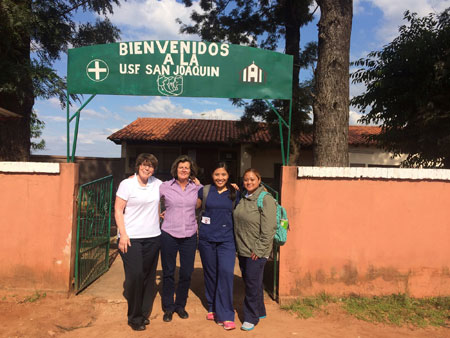Outreach Paraguay Offers Clinical Experience Abroad
June 25, 2015
Students from Drexel University’s College of Nursing and Health Professions’ RN-BSN program have just returned from a unique clinical experience abroad. In collaboration with Outreach Paraguay, this year’s group of 11 students – typically enrolled in the Community Health Nursing course – marked the third group to venture to this South American country for a hands-on, memorable experience.
 This year, the focus of the program was narrowed to increase impact. “The project that we’re engaged in is early detection and prevention of diabetes and hypertension. It’s a very specific program, more geared toward the primary level or preventative care – it’s more educational. Anything we do in Paraguay lasts well beyond our short stay there,” said Eileen Sosa, MSN, adjunct faculty.
This year, the focus of the program was narrowed to increase impact. “The project that we’re engaged in is early detection and prevention of diabetes and hypertension. It’s a very specific program, more geared toward the primary level or preventative care – it’s more educational. Anything we do in Paraguay lasts well beyond our short stay there,” said Eileen Sosa, MSN, adjunct faculty.
Sosa was very familiar with Paraguay from her time spent there as a Peace Corps volunteer in the 1980s. Through the years, she has maintained a relationship with the community and knows the country inside out. All of these factors – paired with the country’s need for resources and education related to diabetes and hypertension – inspired her to implement this incredible student offering which has proven as beneficial for students as the Paraguayan community they are directly working with.
“It’s a life-altering experience. I have not been the same since I returned from Paraguay. I’m more empathetic. I’m more open to cultural change, and I try to understand where people and patients are coming from,” said Kimberly Falciani, a RN- BSN student who went to Paraguay in 2014 (the second year the experience was offered).
Students conducted surveys and offered glucose and blood pressure screenings to help identify community members at risk for developing diabetes or hypertension. Through this initiative, Sosa estimates that they have detected 50 uncontrolled cases of hypertension and 50 uncontrolled cases of diabetes. Preventative care is not a priority in the country’s medical and economic system – people only seek care when they are very ill.
Sosa said, “The emphasis is ‘how can we help you to better control your own health? What can you do from a non-pharmacologic viewpoint to help control your diet and blood sugar in addition to taking medication? How can you take better control in a country that is resource poor?’”
In addition to working in the health post with screenings, this year’s trip reintroduced home visits to the program as well as a visit to a remote college of nursing to participate in classes with the BSN nursing students.
The 11-day trip is available for a small, intimate group of no more than 11 students, and it is a popular opportunity that usually has a wait list for participation. The number is kept small so as not to drain Paraguayan resources and to allow students to have more opportunities to have an exchange with the Paraguayan counterparts and become immersed in the culture.
The Paraguayan community members left a lasting impression on Falciani. She said, “The people there may not have a lot, but they are so welcoming. They’re warm, giving and just amazing. We had so many people thankful for just the screenings we were offering.”
“This is something in terms of a clinical project that is very unique. Our students really get a sense of the needs of a particular community, and look at how another country’s health system is set up – its strengths, its weaknesses. It’s a learning experience. It’s not just us giving to Paraguayans, they are giving to us. It’s a very beautiful exchange program,” said Sosa.